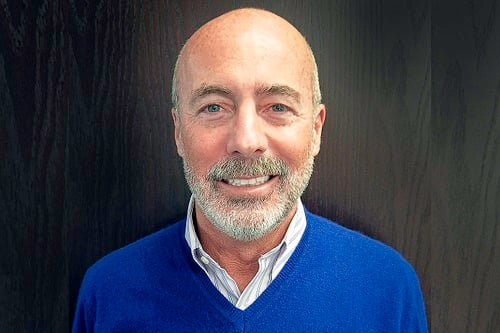As co-founder of First Source Mortgage Corporation, David Mandel has helped finance many of the towers that are emblematic of Toronto’s rise

David Mandel has always had entrepreneurial spirit. Inspired by his father, who was in the variety store business, Mandel was running his own business by Grade 3, taking hockey and baseball cards on consignment, then flipping them for a premium.
“We sold a lot of those cards,” Mandel laughs. “Those were the early, early years. I eventually ran ski tours to Quebec City and nightclub parties once we got there because nobody knew where to go.”
But he had bigger plans. By the time he earned a degree in economics and an MBA, Mandel knew there was absolutely no way he was destined to become an employee. “I started a marketing company doing door-to-door sales, and it grew to be national within two years,” he says.
In 1989, after falling out with his business partners, Mandel pursued an altogether different venture, becoming a mortgage broker. He would soon be plunged into Ontario’s infamous real estate crash, when prices fell precipitously for seven straight years, but Mandel had seen the industry’s potential. He had, moreover, made sound investments in real estate and joined a sister-in-law’s mortgage company.
After spending 10 years there, in what he describes as being like a family business, Mandel founded First Equity in 1998. “I grew First Equity from a one-man show to as many as 21 brokers,” he says. “Coming into the business in the late ’80s, there were a lot of new agents and brokers who came in as well, from all walks of life, but a lot of them didn’t have the knowledge and discipline you get from running your own business. That’s likely what led me to do more sophisticated private and commercial lending early in my career and allowed me to grow to a point where, after many years, we finally launched First Source in 2006.”
Mandel’s business partner in First Source was the late Lionel Larry, “a phenomenal real estate lawyer who also worked as a builder-developer,” he says. “It was the perfect partnership.” However, Mandel and Larry’s initial attempts to launch the company floundered.
“We tried and looked at setting up a mortgage mutual fund trust, but unfortunately, the underwriting company imploded and set us back about two years,” Mandel says. “My late partner, Lionel, was fed up with his construction development business, so I threw a deal on his desk, saying, ‘Let’s just start and put a deal together.’ First Source became licensed and away we went, never looking back.”
Building a new city
Shortly after First Source launched, Toronto began ascending as an international hub of commerce, as manifested by myriad new skyscrapers that have rendered Hogtown virtually unrecognizable from its pre-2000s state. The partnership between Larry and Mandel allowed the nascent company to capitalize on a building boom the likes of which Canada has never seen, leveraging their reputations and acumen to produce eye-popping yields for investors.
“There was incredible demand for yield, as people were exiting the stock market due to its volatility,” Mandel says. “It was as if investors couldn’t get enough of the relative safety and high yields of private mortgage investments, where we focused almost exclusively on first mortgages. We found a niche, particularly in later-stage residential land development. We’d done quite a bit of work with smaller and mid-sized developers at a time when the Ontario government’s housing policy wasn’t keeping up with rising housing demand due to immigration and rising fundamentals. We’d start out at 60% to 70% LTV, and by the time these borrowers were moving through the development stage, our loan-to-value was 30% to 50% LTV.
“We were making really good risk-adjusted returns,” he continues, “typically in the 9% range, for investors with little to no risk of loss in all our first mortgage investments. The appetite for the syndication of these products among our growing investor base was insatiable, and we’ve never had an issue raising money to fund a transaction in all of our years. Our success and organic growth helped us launch our first commercial mortgage mutual fund trust in spring 2017, which has likewise experienced steady growth.”
A new niche
First Source’s focus on financing land development is by design. In contrast to construction financing, fewer variables are outside the firm’s control; Mandel notes that everything from site plan approvals to marketplace adaptability are straightforward.
“You have a lot more control, and along with that business comes industrial and other commercial opportunities,” he says. “We’ve found a niche in gas station financing. You have a borrower who buys a non-flag operation and basically guts it, renovates it, adds all the new equipment through remediation, then builds a new convenience store with a food option. They’re worth a lot of money.”
Specializing in this niche has also allowed Mandel to witness the Canadian dream in action. “I’ve never seen so many relatively new immigrants become multimillionaires in the petroleum industry in such a short period of time, and as borrowers, they don’t get any better,” he says. “They come to Canada, work in warehouses or anything they can find. It’s tough, and they understand the value of hard work, and they slowly put together enough money to participate in the acquisition of their first gas station. Or they’ve worked in the gas station until they’ve saved enough money to buy it. They even employ their whole families. Your risk associated with loss on these is very slim because all the flag petroleum companies have it down to a science where they can tell based on traffic and historical information how many litres of gas the station will pump and how much revenue the convenience store provides.”
Chartered banks typically shy away from these operations, but not B lenders. “We think it’s reasonable risk to help people get to that point as something we understand intimately,” Mandel says. “It’s risk-adjusted from our perspective.”



